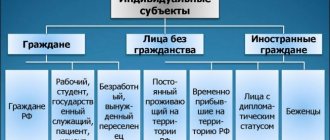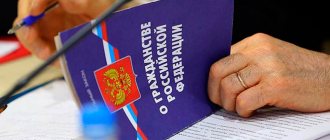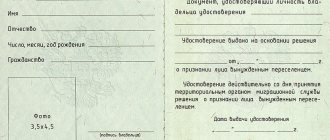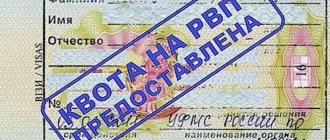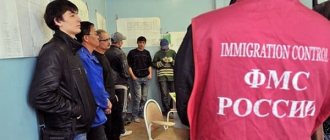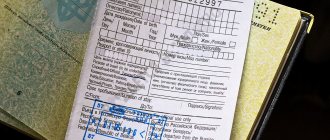Administrative and legal status of foreign citizens and stateless persons
Foreign citizen
– a person who is not a citizen of the Russian Federation and has citizenship (nationality) of a foreign state.
A stateless person is a person who is not a citizen of the Russian Federation and does not have evidence of citizenship of a foreign state.
For the stay of foreign citizens and stateless persons on the territory of the Russian Federation, there is a national regime and a most favored nation regime.
Foreign citizens and stateless persons enjoy rights in the Russian Federation and bear responsibilities on an equal basis with citizens of the Russian Federation, except in cases established by federal law or international treaties of the Russian Federation (Part 3 of Article 62 of the Constitution).
Classification of foreign citizens:
- by length of stay on the territory of the Russian Federation:
- permanent residents of the Russian Federation - foreign citizens who have permission and a residence permit issued by the internal affairs bodies;
- temporarily staying on the territory of the Russian Federation - foreign citizens who are on the territory of the Russian Federation on other legal grounds;
- transiting through the territory of the Russian Federation;
- according to the degree of subordination to the jurisdiction of the Russian Federation:
- citizens with diplomatic immunity;
- citizens who do not have diplomatic immunity;
- military personnel of foreign military units, crews of warships, air force aircraft;
- members of official state, interparliamentary, intergovernmental delegations, missions;
- citizens serving in international organizations;
- citizens working under contracts with Russian institutions, enterprises, organizations;
- witnesses and other persons whose status is determined by international treaties of the Russian Federation;
- for purposes of staying on the territory of the Russian Federation:
- employees of diplomatic and consular institutions, international organizations;
- correspondents and journalists accredited in the Russian Federation;
- teachers in educational institutions;
- persons belonging to the foreign labor force - emigrant workers;
- persons undergoing treatment and rest, etc.
Peculiarities
administrative and legal status of foreign citizens and stateless persons:
- cannot be accepted into the civil service or hold positions in state authorities and local self-government related to the presence of citizenship of the Russian Federation;
- are not allowed to engage in activities related to state secrets;
- cannot participate in the administration of justice;
- have neither active nor passive voting rights;
- do not have the right to participate in a referendum;
- they are not subject to military service;
- cannot be members of political public associations;
- For a number of offenses, only foreign citizens and stateless persons can be held accountable (violation of the stay regime);
- Only foreign citizens and stateless persons are subject to certain administrative penalties (administrative deportation);
- can enter the territory of the Russian Federation with special permits (with the exception of citizens of the Commonwealth of Independent States (CIS), with whom an agreement has been concluded on visa-free entry and exit);
- reside and carry out their activities on the basis of special permits;
- restrictions are established on movement and on the choice of place of stay and residence (border zone, special protected areas);
- they can move freely within the territory open to foreigners, subject to notification of this to the internal affairs bodies;
- may purchase civilian weapons under a license issued by the internal affairs bodies, but only on the basis of requests from the representative offices of the states of which they are citizens, and subject to their removal of weapons from the territory of the Russian Federation - within five days from the date of acquisition;
- in the presence of circumstances established by law, departure from the Russian Federation may not be permitted.
Types of administrative legal personality of foreign citizens.
⇐ PreviousPage 6 of 14Next ⇒
The general administrative legal personality of foreign citizens is close in content to the legal capacity of Russian citizens, except for some restrictions. Basically, they are subject to all constitutional rights, obligations and guarantees established for citizens of the Russian Federation.
Special administrative legal personality is determined by the purpose, as well as the length of time of their stay on the territory of Russia (permanent residents, temporary residents, transiting through our country).
Special administrative legal personality is expressed in the presence of specific rights and obligations for certain categories of foreign citizens (for example, a diplomat, persons who have received political asylum, etc.).
Documents identifying a foreign citizen in the Russian Federation are a foreign citizen’s passport or another document established by federal law or recognized in accordance with an international treaty of the Russian Federation as an identity document of a foreign citizen.
Documents identifying a stateless person in the Russian Federation are:
1) a document issued by a foreign state and recognized in accordance with an international treaty of the Russian Federation as a document certifying the identity of a stateless person;
2) temporary residence permit;
3) residence permit;
4) other documents provided for by federal law or recognized in accordance with an international treaty of the Russian Federation as documents identifying a stateless person.
Legal restrictions on foreigners and stateless persons.
They do not have the right to elect and be elected to federal government bodies, government bodies of the constituent entities of the Federation, to participate in the referendum of the Russian Federation and referendums of its constituent entities.
They do not have the right to enter the state or municipal service; be hired for work related to the provision of state secrets, engage in other activities prohibited for foreign citizens by the legislation of the Russian Federation.
They cannot hold positions in government bodies and engage in certain activities if the legislation of the Russian Federation makes appointment to such positions and the right to engage in such activities conditional on citizenship of the Russian Federation. At the same time, foreign citizens have the right, in accordance with the legislation of the Russian Federation, to enter military service under a contract.
Rights of foreign citizens
— the right to freedom of movement for personal or business purposes within the Russian Federation, with the exception of visiting territories, organizations and facilities for which special permission is required in accordance with federal and state laws. (Resolution of the Government of the Russian Federation dated October 11, 2002 No. 754 “On approval of the list of territories, organizations and objects for which foreign citizens require special permission to enter”).
- at his own request, change his place of residence within the territory of the subject of the Russian Federation, on the territory of which he is allowed temporary residence, or choose a place of residence outside the boundaries of the specified subject of the Russian Federation.
Forms (types) of stay of foreigners on the territory of the Russian Federation.
Temporary stay. Its duration is determined by the validity period of the visa issued to the foreigner. The period of temporary stay in the Russian Federation of a foreigner who arrived in the Russian Federation in a manner that does not require a visa cannot exceed 90 days. A foreign citizen temporarily staying in the Russian Federation is obliged to leave the Russian Federation upon expiration of the visa or the specified period, if at the time of expiration of the specified period he has not received permission to extend the period of stay and for a temporary residence permit.
Temporary residence. A permit for it can be issued within the quota approved by the Government of the Russian Federation (The rules for determining the quota were approved by Decree of the Government of the Russian Federation of April 4, 2003 No. 193 “On approval of the Rules for determining the quota for issuing temporary residence permits to foreign citizens in the Russian Federation”).
The procedure for issuing a temporary residence permit and the list of documents submitted simultaneously with the application for issuing a temporary residence permit are approved by the Government of the Russian Federation (Resolution of the Government of the Russian Federation of November 1, 2002 No. 789 “On approval of the Regulations on issuing permits to foreign citizens and stateless persons temporary residence").
If a foreigner has been refused a temporary residence permit, he has the right to re-submit the same application no earlier than 1 year from the date of rejection of the previous application.
Resident card. An application for it may be submitted during the validity period of the temporary residence permit. The application is submitted to the territorial body of the FMS no later than six months before the expiration of the temporary residence permit. Before receiving a residence permit, a foreign citizen must live in the Russian Federation for at least one year on the basis of a temporary residence permit.
A residence permit is issued for five years. Upon expiration of the validity period, at the request of a foreigner, it can be extended for five years. The number of extensions of the residence permit is not limited.
Peculiarities of administrative responsibility of foreign citizens.
For violation of the law, foreign citizens and stateless persons may be subject to such special measures of administrative coercion as deportation (preventive measure) and administrative expulsion from the Russian Federation (administrative penalty), appointed only by a court (judge).
Lecture 4 (3 hours)
1. Constitution of the Russian Federation.
2. Federal Constitutional Law of December 17, 1997 No. 2-FKZ “On the Government of the Russian Federation” (SZ RF. 1997. No. 51. Art. 5712).
3. Federal Law of October 6, 1999 No. 184-FZ “On the general principles of organization of legislative (representative) and executive bodies of state power of the constituent entities of the Russian Federation” (SZ RF. 1999. No. 42. Art. 5005).
4. Decree of the President of the Russian Federation of March 9, 2004 No. 314 “On the system and structure of federal executive bodies” (SZ RF. 2004. No. 11. Art. 945).
5. Decree of the President of the Russian Federation of May 21, 2012 No. 636 “On the structure of federal executive bodies.”
6. Decree of the Government of the Russian Federation of June 1, 2004 No. 260 “On the Regulations of the Government of the Russian Federation and the Regulations on the Staff of the Government of the Russian Federation” (SZ RF. 2004. No. 23. Art. 2313).
7. Decree of the Government of the Russian Federation of December 5, 2005 No. 725 “On interaction and coordination of the activities of executive authorities of the constituent entities of the Russian Federation and territorial bodies of federal executive authorities” (SZ RF. 2005. No. 50. Art. 5311).
8. Decree of the Government of the Russian Federation of July 28, 2005 No. 452 “On the Model Regulations for the Internal Organization of Federal Executive Bodies” (SZ RF. 2005. No. 31. Art. 3233).
Administrative and legal status of executive authorities
1. Concept, characteristics and types of executive authorities.
2. Principles of organization and activities of executive authorities.
3. Powers of the President of the Russian Federation in the sphere of executive power.
4. Legal status of the Government of the Russian Federation.
5. Federal executive authorities.
6. Executive authorities of the constituent entities of the Russian Federation.
Concept, characteristics and types of executive authorities.
Executive authority is a structural unit of the state power mechanism (state apparatus), created for daily functioning in the system of separation of powers for the purpose of implementing (executing) laws in the process of managing (regulating) the economic, socio-cultural and administrative-political spheres of society. .
⇐ Previous6Next ⇒
Recommended pages:
Administrative and legal status of refugees
Refugee
is a person who is not a citizen of the Russian Federation and who, due to a well-founded fear of becoming a victim of persecution on grounds of race, religion, citizenship, nationality, membership of a particular social group or political opinion, is outside the country of his citizenship and cannot enjoy the protection of this country or is unwilling to avail itself of such protection due to such fears; or, being of no nationality and being outside the country of his former habitual residence as a result of such events, is unable or unwilling to return to it owing to such fear.
Grounds and procedure for recognizing a person as a refugee:
- applying for refugee status;
- preliminary consideration of the application;
- making a decision to issue a certificate of consideration of the application on the merits or to refuse to consider the application on the merits;
- issuance of a certificate or notice of refusal to consider the application on the merits;
- consideration of the application on its merits;
- making a decision on recognition as a refugee or refusal to recognize a refugee;
- issuance of a refugee certificate or notification of refusal of refugee recognition.
A person recognized as a refugee has the following rights.
1. Receive the services of an interpreter and receive information about the procedure for recognition as a refugee, about your rights and obligations, as well as other information.
2. Receive assistance in preparing documents for entry into the territory of the Russian Federation if these persons are located outside the territory of the Russian Federation.
3. Receive assistance in ensuring travel and transportation of luggage to the place of stay in the manner determined by the Government of the Russian Federation.
4. Receive food and use of utilities at a temporary accommodation center in the manner determined by the Government of the Russian Federation, before leaving for a new place of stay.
5. The right to protection by representatives of the territorial body of the federal executive body for internal affairs in a temporary accommodation center in order to ensure the safety of these persons.
6. Use residential premises provided in the manner determined by the Government of the Russian Federation from the housing stock for temporary settlement. A person recognized as a refugee and his family members lose the right to use residential premises from the housing stock for temporary settlement in the event of purchasing, receiving, or renting other housing.
7. Receive medical and medicinal care on an equal basis with citizens of the Russian Federation in accordance with federal laws and other regulatory legal acts of the Russian Federation, laws and other regulatory legal acts of constituent entities of the Russian Federation, unless otherwise provided by international treaties of the Russian Federation.
8. Receive assistance in vocational training or employment on an equal basis with citizens of the Russian Federation in accordance with federal laws and other regulatory legal acts of the Russian Federation, laws and other regulatory legal acts of constituent entities of the Russian Federation, with the exception of cases provided for by the legislation of the Russian Federation and international treaties of the Russian Federation.
9. Work for hire or engage in entrepreneurial activities on an equal basis with citizens of the Russian Federation in accordance with federal laws and other regulatory legal acts of the Russian Federation, laws and other regulatory legal acts of constituent entities of the Russian Federation, with the exception of cases provided for by the legislation of the Russian Federation and international treaties of the Russian Federation.
10. Receive social protection, including social security, on an equal basis with citizens of the Russian Federation in accordance with federal laws and other regulatory legal acts of the Russian Federation, laws and other regulatory legal acts of constituent entities of the Russian Federation, with the exception of cases provided for by the legislation of the Russian Federation and international treaties of the Russian Federation.
11. Receive assistance in placing the children of a person recognized as a refugee in state or municipal preschool and general educational institutions, educational institutions of primary vocational education, as well as in transferring them to educational institutions of secondary vocational and higher vocational education on an equal basis with citizens of the Russian Federation in accordance with federal laws and other regulatory legal acts of the Russian Federation, laws and other regulatory legal acts of constituent entities of the Russian Federation, unless otherwise provided by international treaties of the Russian Federation.
12. Receive assistance from the federal executive body for the migration service in obtaining information about relatives of a person recognized as a refugee living in the state of his citizenship (his former usual place of residence).
13. Contact the territorial body of the federal executive body for the migration service at the place of residence of the person and his family members in order to obtain a travel document for travel outside the territory of the Russian Federation for these persons. The form of the travel document, the procedure for its registration, issuance and exchange are determined by the Government of the Russian Federation.
14. Apply for the right to permanent residence on the territory of the Russian Federation or to acquire citizenship of the Russian Federation in accordance with the legislation of the Russian Federation and international treaties of the Russian Federation.
15. Participate in public activities on an equal basis with citizens of the Russian Federation, except for cases provided for by the legislation of the Russian Federation and international treaties of the Russian Federation.
16. Voluntarily return to the state of your nationality (your former usual place of residence).
17. Travel to your place of residence in a foreign country.
18. Use other rights provided for by the legislation of the Russian Federation and international treaties of the Russian Federation, as well as the legislation of the constituent entities of the Russian Federation.
Responsibilities
persons recognized as refugees:
- comply with the Constitution, federal laws and other regulatory legal acts of the Russian Federation, as well as laws and other regulatory legal acts of the constituent entities of the Russian Federation;
- arrive in a timely manner at a temporary accommodation center or other place of stay determined by the federal executive body for the migration service or its territorial body;
- comply with the established rules of residence and comply with the established requirements of sanitary and hygienic standards of residence in the temporary accommodation center;
- report within seven days to the territorial body of the federal executive body for the migration service information about changes in last name, first name, family composition, marital status, about acquiring citizenship of the Russian Federation or citizenship of another foreign state, or about obtaining a permit for permanent residence in the territory of the Russian Federation;
- report your intention to change your place of residence on the territory of the Russian Federation or move to a place of residence outside the territory of the Russian Federation;
- deregister with the territorial body of the federal executive body for the migration service when changing the place of stay and, within seven days from the date of arrival at the new place of stay, register with the territorial body of the federal executive body for the migration service;
- undergo annual re-registration within the time limits established by the territorial body of the federal executive body for the migration service.
Foreign citizens and stateless persons (stateless persons) have all human rights and freedoms and bear general obligations to the Russian Federation, while the scope of their rights does not include the rights and obligations of citizens of the Russian Federation. Foreign citizens and stateless persons can legally stay
on the territory of the Russian Federation if they have a visa and valid documents proving their identity and recognized on the territory of the Russian Federation as an identity document of a foreign citizen.
a residence permit to legally stay in the Russian Federation.
(i.e., an identification document of a stateless person issued in confirmation of permission for permanent residence in the territory of the Russian Federation to a stateless person or a foreign citizen and confirming their right to freely leave the Russian Federation and return to the Russian Federation). A residence permit is issued by the competent authority of the Russian Federation at the request of a foreign citizen or stateless person.
On the basis of this document, foreigners and stateless persons have the right to freely enter and exit the territory of the Russian Federation upon presentation of valid documents identifying their identity and recognized by the Russian Federation in this capacity.
A residence permit is not provided
if: 1) the entry of a person may harm the defense or security of the state or public order, as well as the protection of public health; 2) during the period of his previous stay in the Russian Federation, a foreign citizen or stateless person was deported; 3) the applicant has an outstanding or unexpunged conviction for committing a crime recognized by the Russian Federation as grave or especially grave; 4) when applying for a visa, a foreign citizen or stateless person was unable to confirm the availability of funds to live in the territory of the Russian Federation and subsequently travel beyond its borders; 5) in relation to a foreign citizen or stateless person, a decision has been made that it is undesirable to stay in the Russian Federation.
In relation to foreign citizens and stateless persons for guilty and punishable acts, administrative expulsion from the Russian Federation (deportation) is allowed.
The deported person must leave the territory of the Russian Federation immediately based on the relevant decision of the competent authorities.
Some categories of persons may be granted political asylum.
Political refuge
is provided in the Russian Federation to foreign citizens and stateless persons who are being persecuted in their country of permanent residence or there is a real threat of becoming a victim of persecution for social and political activities and beliefs that meet the principles recognized by the international community.
Political asylum cannot be granted to persons who support ideas of racial and national hatred, inciting inhumane sentiments and the idea of the superiority of any group of people.
It assumes that the person to whom it is granted has all the rights and freedoms, as well as the obligations of citizens of the Russian Federation, unless otherwise established by federal laws or an international treaty of the Russian Federation.
Asylum is granted on the basis of a person’s application and the Decree of the President of the Russian Federation on the granting of political asylum. This Decree comes into force from the date of its signing.
Table of contents
Administrative and legal status of forced migrants
Forced migrant
– a citizen of the Russian Federation who left his place of residence as a result of violence or other forms of persecution committed against him or his family members, or due to a real danger of being persecuted on the basis of race or nationality, religion, language, as well as on the basis of membership in a particular social group or political convictions that became reasons for conducting hostile campaigns against a specific person or group of people, mass violations of public order.
Rights
a person recognized as a forced migrant:
- independently choose a place of residence on the territory of the Russian Federation, including in one of the settlements offered to him by the territorial body of the migration service. A forced migrant may, in accordance with the established procedure, live with relatives or other persons, subject to their consent to live together, regardless of the size of the living space occupied by relatives or other persons;
- if it is not possible to independently determine your new place of residence on the territory of the Russian Federation, obtain from the federal migration service body or the territorial migration service body in the manner determined by the Government of the Russian Federation, a referral to live in a center for temporary accommodation of forced migrants or in residential premises from the housing stock for temporary settlement forced migrants;
- to receive assistance in ensuring his travel and transportation of luggage to a new place of residence or place of stay in the manner determined by the Government of the Russian Federation. At the same time, low-income persons (a single pensioner, a single disabled person, a family consisting only of pensioners and (or) disabled people, a single parent (person replacing him) with a child or children under the age of 18, a large family with three or more children under the age of 18 years of age) are provided with the right to free travel and baggage transportation from the place of temporary settlement to a new place of residence or to a place of stay on the territory of the Russian Federation.
Responsibilities
a person recognized as a forced migrant:
- comply with the Constitution and laws;
- comply with the established procedure for living in a temporary accommodation center for forced migrants and residential premises from the housing stock for temporary settlement of forced migrants;
- when changing your place of residence before leaving, deregister with the territorial migration service office and register with the territorial migration service agency within one month;
- undergo annual re-registration within the time limits established by the territorial migration service authority.
